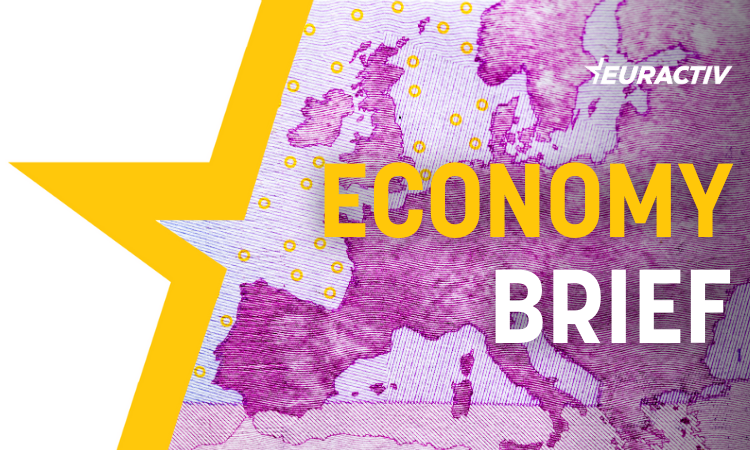
Earlier this week, the White House announced steep tariffs on a range of Chinese imports, including electric vehicles and solar panels, to protect the US economy from Beijing’s “unfair trade practices”.
Chief among these practices, the White House said, is Chinese “overcapacity”. In particular, Beijing stands accused of “flooding global markets with artificially low-priced exports” through “extensive subsidies” and other “non-market policies”.
On this side of the Atlantic, the overcapacity argument has been repeatedly echoed by senior EU officials.
Overcapacity was the stated reason behind the European Commission’s decision to launch an anti-subsidy investigation into Chinese electric vehicles last year — the first in a series of similar probes initiated by the EU executive arm in recent months.
“The world cannot absorb China’s surplus production,” Commission President Ursula von der Leyen said following a meeting with Chinese leader Xi Jinping in Paris last week. “Therefore, I have encouraged the Chinese government to address these structural overcapacities.”
China, in other words, is producing too much stuff. Moreover, it is producing it through “market-distorting” practices that, if left unaddressed, threaten to decimate the US and European economies, and their industries.
For a country whose leaders are famously fond of resorting to metaphors when discussing international affairs, China’s response to these allegations has been surprisingly forthright.
“The US is essentially using the ‘overcapacity’ narrative to kneecap other countries’ strong industries and practice protectionism and trample on market principles and international trade rules in the name of ‘fair competition’,” China’s Foreign Ministry spokesperson Wang Wenbin said on Tuesday, just hours before the US tariffs were announced.
“This is nothing but bullying.”
Wenbin’s suggestion that the US’s ultimate aim is to hinder China’s industrial development may be difficult to dispute, based on US officials’ recent language. US Commerce Secretary Gina Raimondo has explicitly stated that Washington needs to “work with Europe” to “slow down China’s rate of innovation”.
Meanwhile, asked by Euractiv about Raimondo’s comments earlier this year, US Trade Representative Katherine Tai didn’t deny that this is the US objective.
Still, the fact that the US seeks to restrain China’s economic rise doesn’t imply that the allegation of overcapacity is invalid. Moreover, it doesn’t explain why the EU — which does not want to explicitly hinder China’s business — is making similar allegations as the US.
So: Are the allegations valid? Is China (unfairly) producing too much stuff?
In his comments on Tuesday, Wenbin gave two different arguments that attempted to rebut Western criticisms of China’s trade practices.
The first is that many of the products China manufactures are not only not harmful, but are crucial for greening the world’s economy and combating the existential threat posed by climate change — thereby ultimately benefiting everybody.
“The fast-growing Chinese new energy industries are what the world economy needs for [the] green transition,” Wenbin noted. “It serves the interest of China, the US, and the whole world.”
This point is echoed by some (mostly progressive) European politicians.
José Gusmão, a Left Group MEP who serves as vice-chair of the European Parliament’s committee on economic and monetary affairs, recently told Euractiv that worrying about over-production may be misplaced. “If anything, we’re underproducing,” he said, referring to global goals of fighting climate change.
“It’s certainly not overproduction in terms of the world’s objectives to fight climate change,” he said.
While this argument could have a ring of plausibility, the problem lies in the fact that not all goods that China is accused of overproducing are “pure” green technologies. Indeed, in addition to solar panels and electric vehicles, the US has also hiked tariffs on Chinese steel and aluminium — goods which are still (mostly) produced in a highly carbon-intensive way.
Wenbin’s second argument — probably easier to back up — is that the West is being hypocritical when it accuses China of subsidising strategic industries.
In particular, he noted, the US is hardly immune from engaging in “non-market practices” of its own. The CHIPS and Science Act, for instance, provides $280 billion in subsidies to incentivise the manufacturing of semiconductors in the US.
Similarly, the Inflation Reduction Act offers up to $1.2 trillion to promote the manufacturing of green technologies, including electric vehicles and solar panels — precisely the products China is accused of unfairly subsidising.
“There’s a Chinese saying for that logic, ‘The magistrate allows himself to set [a] fire but bans everyone else from lighting candles,’” Wenbin said. “Or, to use a US expression, ‘Do as I say, not as I do.’”
In an interview published last week, US Treasury Secretary Janet Yellen was specifically asked about Washington’s allegation of Chinese overcapacity, with the interviewer pointing out that the Biden administration is also currently “pouring billions in” with “investments in the CHIPS Act and infrastructure and all that”.
Yellen responded that, while the US has “targeted a few industries, particularly clean energy, electric vehicles, batteries, renewables”, it is “not trying to dominate the globe and be the only country in the world that supplies these goods.”
This, of course, raises the question: Is China attempting to “dominate” the globe for all these goods?
The claim is certainly plausible for some specific products. China’s global market share for solar panels, for instance, currently stands at 80% — giving it an effective global monopoly.
However, Yellen’s argument is not plausible for all the products China is accused of overproducing.
Take electric vehicles. Last year, China exported 1.2 million electric vehicles. By contrast, South Korea— another major car exporter — exported only 349,000.
However, one should also keep in mind that China’s population is more than 27 times greater than South Korea’s (1.4 billion vs 51 million). This means that per capita — surely the appropriate form of comparison when discussing allegations of overcapacity — China’s electric vehicle production is roughly eight times less than South Korea’s.
In other words: if China has an overcapacity problem, South Korea has a super-overcapacity problem.
This, in turn, suggests that the root cause of what is contested by the US and Europe as calculated overcapacity may rather lie in the fact that China is simply vast — and has a colossal economic potential.
Chart of the Week
On Wednesday (15 May), the European Commission downgraded its projected GDP growth for the eurozone next year from 1.5% to 1.4%.
This came just weeks after the International Monetary Fund cut its projected growth for the eurozone for next year by 0.2 percentage points to 1.5%.
Our Chart of the Week shows the IMF projections have consistently overshot other economists’ projections (and actual GDP growth performance), often proving overly optimistic.
Economic Policy Roundup
The US increase in tariffs on China’s electric vehicles (EVs) and other products unveiled on Monday (15 May) is splitting the EU’s centre-left Socialists & Democrats (S&D) along the lines of a Franco-German divide on whether Europe should follow up with a similar measure. While Bernd Lange from German SPD, head of the EU parliament’s trade committee, called the move “an inglorious chapter […] added to the America First saga,” his French S&D colleague Aurore Lalucq told Euractiv “the US is right” to impose new tariffs, calling upon the EU to do the same. Read more.
The EU’s multi-billion pandemic recovery fund is the key “piece in the jigsaw” of how to finance the bloc’s core economic objectives until private markets are sufficiently integrated, said Eurogroup President Paschal Donohoe. Speaking to Euractiv ahead of a meeting of eurozone finance ministers in Brussels on Monday (13 May), Donohoe said that the €806.9 billion Next Generation EU (NextGenEU) is key to boosting the bloc’s lagging competitiveness — as member states grapple with bloc’s stringent new fiscal rules. “[NextGenEU] for me, is the piece in the jigsaw that allows us to reconcile the need to normalise budget policy but give a higher priority to capital investment than we’ve done in the past,” Donohoe said.
Europe should deregulate its economy and “develop a culture of private investment” similar to the US, according to Vice Chair of the European Parliament’s Committee of Economic and Monetary Affairs Michiel Hoogeveen. The Dutch MEP from the European Conservatives and Reformists Group (ECR) told Euractiv that “obviously regulation is necessary”, but warned that the raft of new EU rules, including those relating to corporate sustainability and forced labour, is “overstepping” what is required. “If you deregulate too much, things could get out of control,” he said, pointing to the role played by financial deregulation in the lead-up to the 2008 financial crisis. “But right now we are overstepping [on] fiscal regulation, financial regulation, climate regulation, gender regulation — all kinds of regulatory burdens are put on our businesses.”
Member states keen on integrating their capital markets will likely move ahead by themselves if no EU-wide consensus can be reached, said European Commissioner for Economy Paolo Gentiloni. “We should move forward as a union, and we are all committed to doing so,” Gentiloni said after the meeting of eurozone finance ministers in Brussels on Monday (13 May), following a question by Euractiv. “But I expect that if strong progress will not be possible, some member states will move in a different way of cooperation.” “This is not the Commission’s suggestion or authorisation,” he noted, “This is what I expect.” Gentiloni’s remarks reflect growing frustration among many EU policymakers about the lack of progress in deepening the bloc’s Capital Markets Union (CMU), plans for which were first announced in 2015.
A report published on Wednesday (15 May) by consultancy Carbone4 backed up calls for the introduction of a “Buy European and Sustainable Act”, which would regulate how public authorities across the bloc award public procurement contracts by introducing environmental and EU origin criteria. “[Public procurement] cannot be overlooked by Europe’s policymakers if they are serious about meeting climate targets and (…) modernising sectors vital to the economies of member states, including struggling farmers,” Antoine Crépel, coordinator of the study, said in a press release on Wednesday. According to a legal analysis accompanying the report and supported by Europe Jacques Delors think tank, the scheme might be compatible with the World Trade Organisation’s (WTO) non-discrimination principle, which allows for an exemption for public procurement. Read more
A permanent tax on European companies’ excess profits could generate more than €100 billion per year, or over half of the EU’s annual budget, according to a new report commissioned by the European Parliament’s Left Group. Drawing on a technical definition of “excess profits” proposed by the OECD, the study published on Thursday (16 May) estimates that businesses made roughly €2 trillion in excess profits globally in 2022, of which €310 billion originated in the EU. Taxed at a progressive rate of 20-40%, these earnings would yield €107 billion in public funds, which could be used to finance key green and digital investments and tackle inequality, the report notes. The EU’s current annual budget amounts to €160-180 billion.
French government says low-carbon electricity mix is magnet for foreign investment. The French government cited the decarbonised nature of the country’s electricity mix as an unparalleled asset in attracting foreign investment, but the reality is more complex. In this year’s Choose France event, around a third of the record €15 billion of foreign investment announced went to projects linked to decarbonisation. For example, tech giant Microsoft announced an investment of €4 billion in new data centres in France – a move French officials attributed to the country’s “decarbonised electricity”. But the reality is more complex. The decarbonised electricity mix is attractive, but the price of electricity, the reliability of the grid, and other criteria are just as important. Read more
Literature Corner
China-Russia: An economic ‘friendship’ that could rattle the world
Preparing for the Second China Shock
[Edited by Anna Brunetti/Zoran Radosavljevic]







